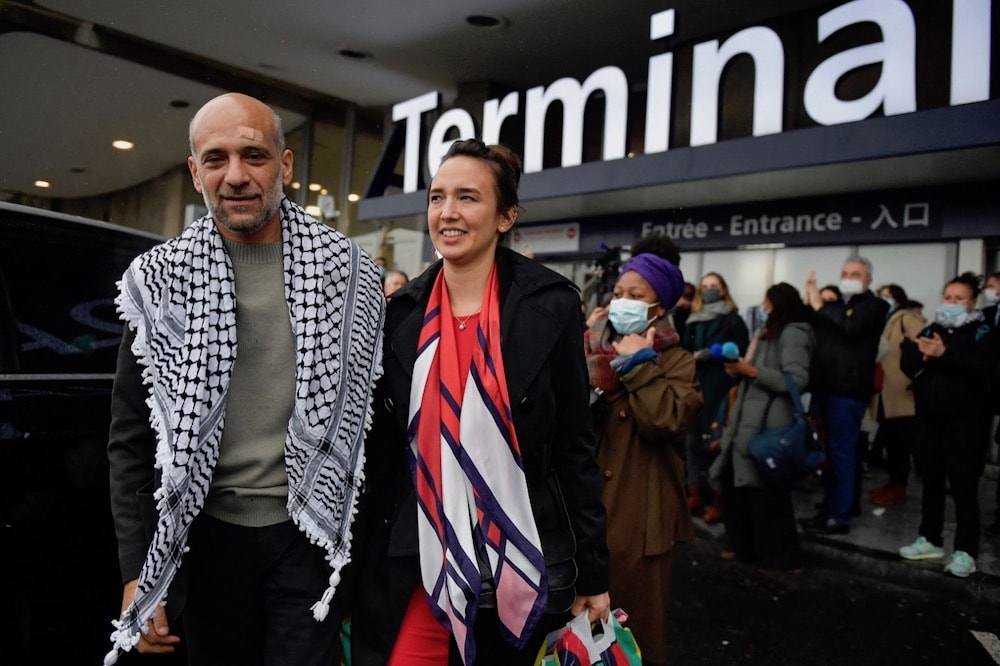IFEX joins rights groups demanding remedies from the Egyptian government for Ramy Shaath's imprisonment and his wife's Celine Lebrun-Shaath's deportation.
This statement was originally published on cihrs.org on 12 December 2022.
We, the undersigned organizations, express our solidarity with former political prisoner Ramy Shaath, and his wife Ms. Céline Lebrun-Shaath, in their complaint against the Egyptian government. The complaint was submitted with the African Commission on Human and Peoples’ Rights (ACHPR) on 12 December 2022, by the Open Society Justice Initiative in collaboration with the Cairo Institute for Human Rights Studies (CIHRS), the Freedom Initiative (FI), and the Tahrir Institute for Middle East Policy (TIMEP). The undersigned organizations welcome these efforts as a significant step toward accountability for abuses committed by the Egyptian government and its officials.
The complaint demands remedies from the Egyptian government to compensate Mr. Shaath and Ms. Lebrun-Shaath for the violations against them over the course of Mr. Shaath’s imprisonment and Ms. Lebrun-Shaath’s deportation, as well as demands that the Egyptian government’s future laws and behavior are brought into agreement with the African Charter and Egypt’s other international obligations.
The plight of Mr. Shaath is emblematic of the ordeal experienced by tens of thousands of other political prisoners in Egypt. Periods of enforced disappearance, near-automatic renewal of pretrial detention on unfounded terrorism allegations, absence of due process, and violation of prisoners’ rights (including those stipulated by Egyptian prison regulations), are the daily reality for thousands of those who exercise their right to free expression and association in Egypt.
In July 2019, Mr. Shaath was arrested and held in pretrial detention for 30 months, and his wife Ms. Lebrun-Shaath, a French national, was arbitrarily deported from Egypt without being allowed to contact the French embassy. During the first 36 hours of his arrest, Mr. Shaath was forcibly disappeared and interrogated without access to his lawyer, before being remanded into pretrial detention on allegations of providing “assistance to a terrorist group” under case no. 930/2019. Over the course of Mr. Shaath’s detention, neither he nor his lawyer were presented with evidence supporting the charges against him, which were based solely on unsupported National Security Agency claims. For the first five months, under Egyptian counterterrorism legislation, his detention was renewed by the supreme state security prosecutor’s office. The remaining period of detention was ordered by a court in 45-day increments without providing proof or legal justification, and in several instances he and his lawyer were denied access to the hearing.
During the period of his detention, a court also added Mr. Shaath to another case (no. 517/2020) and to the Egyptian government’s “terrorism list.” The court took this decision in the absence of Mr. Shaath and his lawyer, who were not informed of the case’s existence and only learned about it from Egyptian press reports. Consequently, Mr. Shaath was put under a travel ban and his assets were frozen. Due to international pressure, Mr. Shaath was ultimately released from detention in January 2022, but only after he was forced to renounce his Egyptian nationality and deported out of his country.
Mr. Shaath and Ms. Lebrun-Shaath are compelled to pursue justice through the African Commission, a regional body and not a national one, due to the unwillingness and inability of Egyptian judicial institutions to conduct an impartial investigation into those transgressions, as shown by their complicity in the violations committed against tens of thousands of political prisoners, including Mr. Shaath.
The complaint demands that the Egyptian authorities immediately reinstate Mr. Shaath’s Egyptian nationality, drop the charges against him and close the aforementioned cases which include dozens of other peaceful activists, return the property confiscated from Mr. Shaath and Ms. Lebrun-Shaath upon his arrest, remove Mr. Shaath from the “terrorism list” and bring Egyptian legislation, especially that concerning counterterrorism, into conformity with Egypt’s international human rights commitments.
The undersigned organizations support these demands, and call on the Egyptian authorities to correct the injustices committed against Mr. Shaath and tens of thousands of political prisoners in Egypt and put an end to forced disappearances, wrongful imprisonment, and due process and fair trial violations.



